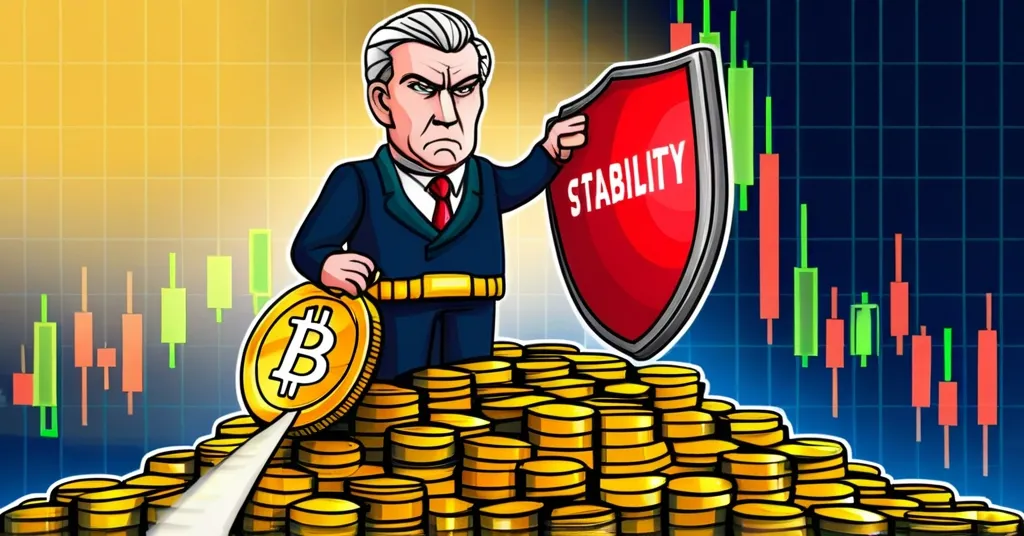Poland’s Central Bank Dismisses Bitcoin, Boosts Gold Reserves for Stability

Poland’s Central Bank Rejects Bitcoin for Reserve Stability
Can Bitcoin ever become a trusted reserve asset? Poland’s central bank, Narodowy Bank Polski (NBP), says a resounding “no.” NBP President Adam Glapiński has made it clear that the bank’s reserves must remain absolutely secure, and Bitcoin’s notorious volatility simply doesn’t cut it.
- NBP rejects Bitcoin for reserves due to security and stability concerns.
- President Adam Glapiński highlights Bitcoin’s volatility as a risk.
- Poland’s reserves primarily held in gold, U.S. dollars, and euros.
- Strategic increase in gold reserves during economic uncertainty.
- NBP’s stance reflects a broader risk management strategy.
NBP’s Stance on Bitcoin
Poland’s central bank isn’t just skeptical; it’s outright dismissive of Bitcoin’s potential. “We will not consider Bitcoin under any circumstances, as reserves must be absolutely secure,” Glapiński declared. This isn’t just a passing comment; it’s a firm policy rooted in a serious worry about the built-in dangers of cryptocurrencies. Bitcoin’s volatility is like a rollercoaster that no central banker wants to ride when it comes to national reserves. Imagine trying to plan your country’s financial future when your reserve asset could swing wildly from one day to the next!
The risks associated with Bitcoin are legion: theft, lack of guarantees, and of course, that heart-stopping volatility. For an institution like the NBP, tasked with safeguarding the nation’s economic stability, these are deal-breakers.
Poland’s Reserve Strategy
So, what does Poland’s central bank prefer? The tried-and-true assets of gold, U.S. dollars, and euros. Fiat currencies are government-issued money like the U.S. dollar and euro, not backed by a physical commodity. These are the cornerstones of Poland’s reserves, providing a solid foundation for financial stability. And when it comes to gold, Poland isn’t just sitting on its hands. The nation has been strategically increasing its gold reserves, adding a hefty 90 tonnes in 2024 alone. This move isn’t just about shiny metal; it’s a hedge against economic uncertainty and a nod to gold’s rising value during turbulent times.
As of January 2025, Poland’s official reserves stood at a formidable EUR 217.1 billion (USD 225.4 billion), marking a 22.1% increase from the previous year. This strategic move aligns with a global trend where central banks, including Poland’s, are bolstering their gold holdings amidst geopolitical tensions and economic instability.
Global Context
Poland’s stance on Bitcoin isn’t an outlier in the global financial landscape. Central banks worldwide are grappling with the potential of digital currencies as reserve assets, with varying degrees of acceptance and skepticism. Some, like the People’s Bank of China, are exploring digital currencies, while others, like the Bundesbank in Germany, remain cautious. But when it comes to gold, the trend is clear. The World Gold Council (WGC) reported a record 4,974 metric tonnes of gold bought in 2024, driven significantly by central banks looking for a safe haven amidst global uncertainties.
John Reade, Senior Market Strategist at the WGC, expressed surprise at the high level of central bank gold purchases in 2024. “It’s a clear signal that central banks are seeking to diversify their reserves and reduce reliance on Western financial systems,” he noted. This global trend underscores Poland’s decision to double down on traditional assets like gold and fiat currencies, reflecting a conservative yet strategic approach to maintaining financial stability in an unpredictable world.
Implications and Future Outlook
So, what does this mean for Bitcoin and other cryptocurrencies? While they continue to disrupt and innovate the financial landscape, they face significant hurdles in being recognized as stable reserve assets by traditional financial institutions. Poland’s central bank stands as a testament to the enduring appeal of gold and fiat currencies in the face of digital disruption. But does this mean Bitcoin is doomed to remain on the sidelines?
Not necessarily. The crypto community might argue that this is a missed opportunity for Poland, a chance to embrace the future of money. However, for now, the NBP’s focus remains firmly on stability and security. As we look to the future, it’s worth considering whether Poland’s approach will evolve as cryptocurrencies mature and possibly gain more acceptance among central banks globally.
Key Takeaways and Questions
- Does Poland’s central bank consider Bitcoin a viable reserve asset?
No, Poland’s central bank firmly rejects Bitcoin as a reserve asset due to concerns over security and stability.
- What are the primary assets in Poland’s reserves?
Poland’s reserves are primarily held in gold, U.S. dollars, and euros.
- Why has Poland increased its gold reserves?
Poland has strategically increased its gold reserves, recognizing the rising value of gold during times of economic uncertainty.
- What risks does Poland’s central bank associate with Bitcoin?
The NBP associates risks such as theft, lack of guarantees, and volatility with Bitcoin.
- How has Poland’s official reserves changed recently?
As of January 2025, Poland’s official reserves had grown to EUR 217.1 billion (USD 225.4 billion), a 22.1% increase from the previous year.
Conclusion
Poland’s central bank’s rejection of Bitcoin underscores a commitment to stability and security over the speculative allure of cryptocurrencies. With reserves primarily in gold, U.S. dollars, and euros, and a strategic increase in gold holdings, the NBP is playing it safe in an uncertain world. As global trends show other central banks following suit, it’s clear that traditional assets still hold sway in the halls of financial power. But as we look to the future, one must ask: Is Poland’s rejection of Bitcoin a missed opportunity or a prudent financial decision?



